Hamidreza Dastmalchi
Adapt-As-You-Walk Through the Clouds: Training-Free Online Test-Time Adaptation of 3D Vision-Language Foundation Models
Nov 19, 2025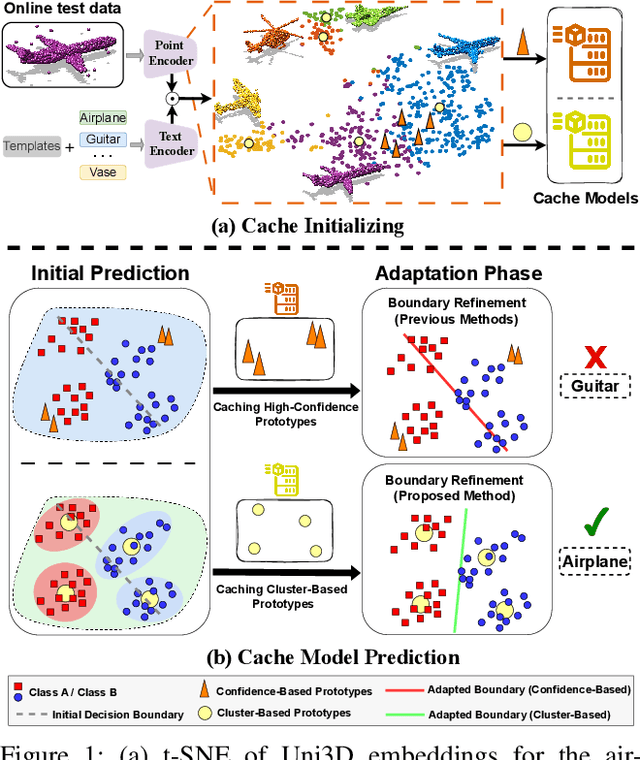
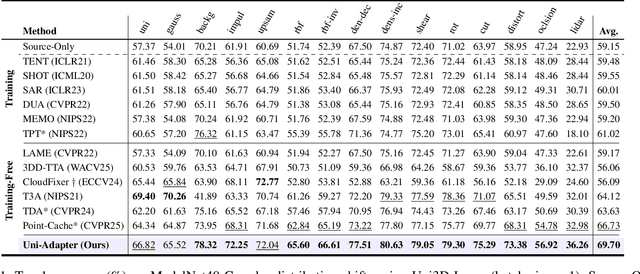
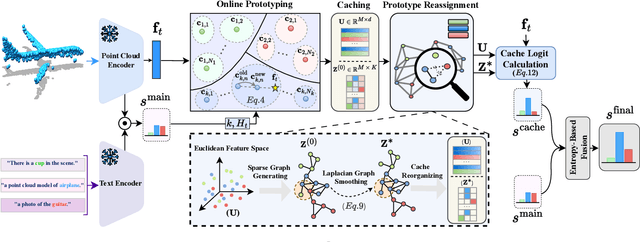
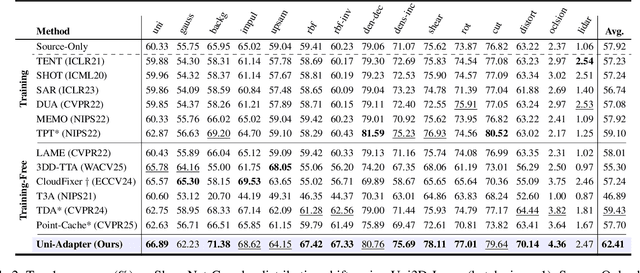
Abstract:3D Vision-Language Foundation Models (VLFMs) have shown strong generalization and zero-shot recognition capabilities in open-world point cloud processing tasks. However, these models often underperform in practical scenarios where data are noisy, incomplete, or drawn from a different distribution than the training data. To address this, we propose Uni-Adapter, a novel training-free online test-time adaptation (TTA) strategy for 3D VLFMs based on dynamic prototype learning. We define a 3D cache to store class-specific cluster centers as prototypes, which are continuously updated to capture intra-class variability in heterogeneous data distributions. These dynamic prototypes serve as anchors for cache-based logit computation via similarity scoring. Simultaneously, a graph-based label smoothing module captures inter-prototype similarities to enforce label consistency among similar prototypes. Finally, we unify predictions from the original 3D VLFM and the refined 3D cache using entropy-weighted aggregation for reliable adaptation. Without retraining, Uni-Adapter effectively mitigates distribution shifts, achieving state-of-the-art performance on diverse 3D benchmarks over different 3D VLFMs, improving ModelNet-40C by 10.55%, ScanObjectNN-C by 8.26%, and ShapeNet-C by 4.49% over the source 3D VLFMs.
Test-Time Adaptation of 3D Point Clouds via Denoising Diffusion Models
Nov 21, 2024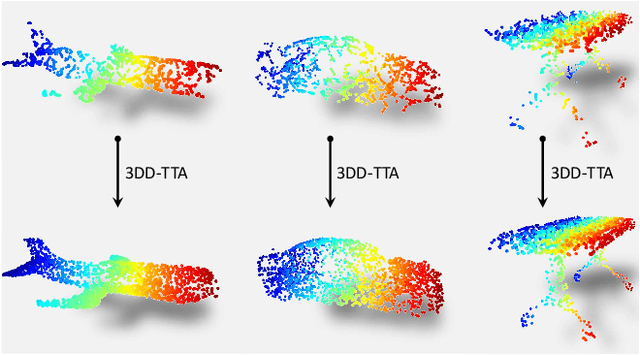



Abstract:Test-time adaptation (TTA) of 3D point clouds is crucial for mitigating discrepancies between training and testing samples in real-world scenarios, particularly when handling corrupted point clouds. LiDAR data, for instance, can be affected by sensor failures or environmental factors, causing domain gaps. Adapting models to these distribution shifts online is crucial, as training for every possible variation is impractical. Existing methods often focus on fine-tuning pre-trained models based on self-supervised learning or pseudo-labeling, which can lead to forgetting valuable source domain knowledge over time and reduce generalization on future tests. In this paper, we introduce a novel 3D test-time adaptation method, termed 3DD-TTA, which stands for 3D Denoising Diffusion Test-Time Adaptation. This method uses a diffusion strategy that adapts input point cloud samples to the source domain while keeping the source model parameters intact. The approach uses a Variational Autoencoder (VAE) to encode the corrupted point cloud into a shape latent and latent points. These latent points are corrupted with Gaussian noise and subjected to a denoising diffusion process. During this process, both the shape latent and latent points are updated to preserve fidelity, guiding the denoising toward generating consistent samples that align more closely with the source domain. We conduct extensive experiments on the ShapeNet dataset and investigate its generalizability on ModelNet40 and ScanObjectNN, achieving state-of-the-art results. The code has been released at \url{https://github.com/hamidreza-dastmalchi/3DD-TTA}.
Foundation Model-Powered 3D Few-Shot Class Incremental Learning via Training-free Adaptor
Oct 11, 2024Abstract:Recent advances in deep learning for processing point clouds hold increased interest in Few-Shot Class Incremental Learning (FSCIL) for 3D computer vision. This paper introduces a new method to tackle the Few-Shot Continual Incremental Learning (FSCIL) problem in 3D point cloud environments. We leverage a foundational 3D model trained extensively on point cloud data. Drawing from recent improvements in foundation models, known for their ability to work well across different tasks, we propose a novel strategy that does not require additional training to adapt to new tasks. Our approach uses a dual cache system: first, it uses previous test samples based on how confident the model was in its predictions to prevent forgetting, and second, it includes a small number of new task samples to prevent overfitting. This dynamic adaptation ensures strong performance across different learning tasks without needing lots of fine-tuning. We tested our approach on datasets like ModelNet, ShapeNet, ScanObjectNN, and CO3D, showing that it outperforms other FSCIL methods and demonstrating its effectiveness and versatility. The code is available at \url{https://github.com/ahmadisahar/ACCV_FCIL3D}.
 Add to Chrome
Add to Chrome Add to Firefox
Add to Firefox Add to Edge
Add to Edge